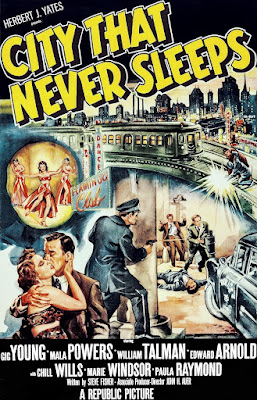City
That Never Sleeps
from Nov. 16, 2009
directed by JOHN H. AUER / written by STEVE
FISHER / starring: GIG YOUNG, MALA POWERS, WILLIAM TALMAN, EDWARD ARNOLD, CHILL WILLS, and MARIE WINDSOR
Last night we watched a fierce little B+
movie called City That Never Sleeps (1953). This was one of the films
Herbert Yates hoped would convince Hollywood and distributors alike that
Republic Pictures could produce more than programmers. The days when Gene
Autry and Roy Rogers brought in millions were over. TV now gave away cowboys
and old serials free.
After
it was over I went to IMDb to
see what some others thought of it. Thirty-one people posted opinions and
nearly all of them mentioned two things—how “odd” the movie was and how wrong
Chill Wills was for it.
Gig
Young plays Johnny Kelly, a Chicago street cop who is cheating on his wife with
Mala Powers. Their plan is to run away together. But Johnny’s father, a
detective on the force, senses something wrong and pleads with him to talk
about it. But Johnny won’t. Johnny needs money. He hates being broke all the
time and he also hates the fact that his wife Paula makes more money than he
does. He goes to a crooked lawyer, Biddell played by Edward Arnold. Arnold
offers him five grand to interrupt a robbery that will take place later that
night, a robbery done by one of his most trusted men, Stewart, the actor
William Tallman. But there’s something about the set-up Johnny doesn’t like and
he starts to walk. Then Biddell coyly mentions that Johnny’s young brother will
be in on the heist, too. If Johnny wants to protect him, he’d better be there.
Everything is now set in motion.
The
screenplay is generally excellent but because it’s by Steve Fisher (a writer I
like) it has to have a few mandatory moments of treacle and at least one weird
narrative trick. The trick here is having Chill Wills (who in God’s name cast
him?) do the voice over as the soul of the city or somesuch. We’re panning
parts of old Chicago and Wills is intoning all the pulp cliches about cities (Tonight
there will be death in the streets and birth in the hospitals, etc.) and
then—Wills shows up as Johnny’s squad car partner for the night where he
continues to pontificate, mostly about what swell guys cops are.
The
direction by John H. Auer and the cinematography John L. Russell are excellent.
This is a noir in the classical sense. Mala Powers is very good and William
Tallman, a cunning and convincing actor who never got his due, makes an
unsettling villain. When he goes crazy you buy every second of it.
As
I watched it, I thought about Gig Young. Just about everything I’ve read about
him noted that beneath the droll charm there was great anger and bitterness. He
lived in the bottle. But in this role he got to drop all the bullshit. Here he
is much closer to the Gig Young his biographers portrayed—bitter, self-pitying,
confused, afraid.
By
movie’s end I realized that even though he’d won the Academy Award (best
supporting) for his too-flamboyant depiction of the dance marathon conductor [in
They Shoot Horses, Don’t They], he’d been miscast. He should have played
the lead. I’ve always thought that They Shoot Horses, Don’t They was a
miserable film. Jane Fonda was too slick and showy, Michael Sarrazin dull and
useless. Young could still have done it back then. He would have brought real
neurotic depth to the drifter who takes up with Gloria. His performance in City
That Never Sleeps show that.
A
fine little movie. Not perfect but passionate and memorable.
And
by the way, there was another piece of miscasting [in They Shoot Horses, Don’t
They]. Instead of Bonnie Bedelia being fourth billed, she should have had
Jane Fonda’s part. Bonnie Bedelia has been there.
Click here to purchase the
Blu-ray or here to purchase the DVD on Amazon. This
article originally appeared on Ed Gorman’s blog, New Improved Gorman,
on Nov. 29, 2009. It is reprinted here by permission. Ed wrote dozens of novels
in a variety of genres, but his most popular work (and my favorite of his work)
was in the crime and western genres. His ten Sam McCain mysteries—set in the
fictional Iowa town of Black River Falls during the 1950s, ’60, and ’70s—are
suspenseful, mysterious, and often funny excursions into small town America. The
New York Times called Sam McCain, “The kind of hero any small town could
take to its heart” and The Seattle Times called McCain “an intriguing
mix of knight errant and realist…”
But
Ed was also a tireless reader and promoter of other writers’ work. His
blogs—there were three, none of them operating at the same time—are treasure
troves for readers of crime, horror, and western fiction both old and new. Ed
died Oct. 14, 2016.
Click
here to check out Ed Gorman’s Sam McCain novels on Amazon.
|


No comments:
Post a Comment